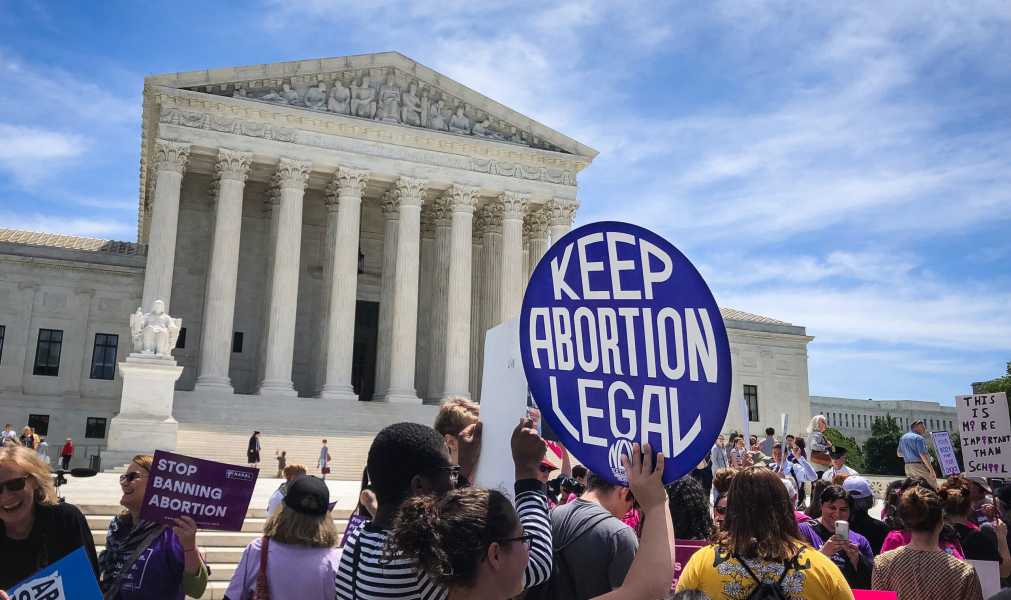The conflict between democracy and competing sets of morality is a story for our times.

On International Women’s Day, it is the tradition of modern women to grumble about men. Permit me to join them: My grievance is with the majority male French Parliament, which on Monday voted overwhelmingly to enshrine a right to abortion in the French constitution.
France’s move is mostly symbolic: The country prides itself on being ahead of the curve of liberal democracy, meaning the legal freedom to kill the unborn is unlikely to be curtailed in French law regardless of what the constitution says. But after the United States Supreme Court’s Dobbs decision, France’s President Emmanuel Macron promised to provide constitutional protection for infanticide too. The French parliament kept that promise Monday afternoon, making it the first nation to create a right to abortion in its foundational document. The streets of Paris ran purple with women and men celebrating their freedom to kill.
The streets of Paris, of course, are used to this kind of scene. It has not been many years since 1789 that they have not been filled with some manner of demonstration in the name of liberation: To list even the names of these frequent protests would be an essay in itself. The French people’s demand for freedom, stretching back to the Revolution era cry for liberté, has resulted in a lot of dead brothers, born and unborn.
For those Americans watching, this is not just political theater. France moved to make abortion sovereign this week precisely because the United States Supreme Court has said that it is not, at least not according to the U.S. Constitution as currently written. This is the contagious nature of rebellions which so concerned the American founders. Considering their own revolt would inspire the events leading to the Reign of Terror in France, which in turn spurred the 13-year bloodbath in Saint-Domingue, as Haitian slaves overthrew their French colonial masters, it was a reasonable concern.
But perhaps it is the particular nature of France to be cataclysmic. It is there that the egalitarian ideals of the Enlightenment have their origin and most poignant picture, and many of the same ideals are responsible for our current inverted mores on the question of infanticide. Revolutionary France saw the “rights of men” through the lens of immediacy—the rights of these men, often paid for with the lives of others—in a sense the American colonists, with their concern for posterity, did not. Similarly, the rights of women today have been underwritten by the blood sacrifice of the unborn. Of all the nations to make abortion a constitutional right first, it is not surprising that it was France.
While the Enlightenment heavily influenced our own nation’s founding, at least one French observer noticed the early Americans’ character was a happy antidote to many of democracy’s ills. As late as the 1830s, Alexis de Tocqueville described men and women still interacting under what Scott Yenor recently termed a “soft patriarchy,” either out of habit or preference, despite several decades under a democratic regime. Revolutionary France, meanwhile, downgraded the penalty for abortion and granted women immunity for the crime almost immediately—a small but significant shift at a time when the punishment for abortion was still commonly death. A simple comparison of the American and French Revolutions illustrates the wide difference between the two peoples in the 18th century, which persisted at least into the 19th.
That difference has shrunk substantially in the last century. Our soft patriarchy has given way to a near total gynocracy, as the modern American republic attempts to realize the French ideal of interchangeable men and women. Essential to this change, of course, is the removal of the burden of childbearing, which naturally falls asymmetrically on women.
Subscribe Today Get daily emails in your inbox Email Address:
Also essential is the use of democratic tactics to do so. Outsourcing law from the legislator, who in theory spends his day contemplating the best forms of government, to a popular vote, where voters might think for a few hours at most before deciding, will almost always have the effect of creating worse legislation. There are few differences between legislators and voters today anyhow, but that just proves the point: The age-old anxiety that the tendency of democracy is away from thoughtful and intelligent discourse and toward demagoguery.
Under this interpretation, the American abortion mob has ruled through ballot measures. Since June 2022, six states have voted to amend their constitutions regarding abortion. In every case, from California to Ohio, the side of the proposal favoring decreased regulation of abortion won. Seeing these victories, another 13 states, including Republican bastions like Florida and South Dakota, will attempt to do the same before the year is out. The same results now seem practically guaranteed in every state where the constitution may be amended by ballot proposal. As Ohio showed, attempting to revoke direct democracy after an abortion proposal has made it onto the ballot just makes you lose harder. The slope is, in fact, slippery.
Only a handful of states like Tennessee, which grants the privilege of constitutional amendment only to elected representatives, are immune to such challenges going forward. That is, only those states in which republican elements are favored over direct democracy may stop the bleeding.
Sourse: theamericanconservative.com